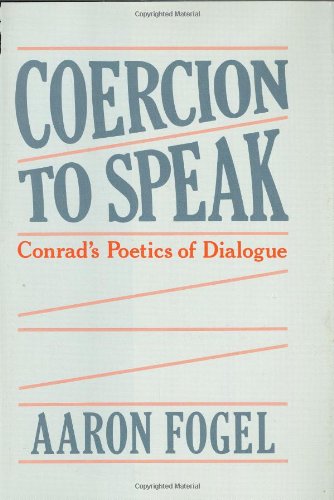Artículos relacionados a Coercion to Speak: Conrad's Poetics of Dialogue

Sinopsis
Novelists have individually distinctive ideas of dialogue, Aaron Fogel argues. In this analysis of Conrad's narrative craft he explores--with broad implications--the theory and uses of dialogue.
Conrad's was a distinctive reading of the English language conditioned by his particular idea of forced speech and forced writing. Fogel shows how Conrad shaped ideas and events and interpreted character and institutions by means of dialogues representing not free exchange but various forms of forcing another to respond. He applied this format not only to the obvious political contexts, such as inquisition or spying, but also to seemingly more private relations, such as marriage, commerce, and storytelling. His idea of dialogue shaded the meanings he gave to words even to characters' names. Conrad is particularly interested in scenes in which a speech-forcer is surprised, repudiated, or punished. Fogel concludes that Conrad increasingly saw the punishment of the speech-forcer as classically related to Oedipus inquiries, in which the provoked answers rebound upon and destroy the forcer. This punishment is--as Shakespeare, Scott, and Wordsworth also dramatically intuited--the classical Oedipal dialogue scene.
Fogel's analysis ranges widely over Conrad's fiction but focuses especially on Nostromo, The Secret Agent, and Under Western Eyes. His readings offer a balanced critique of Mikhail Bakhtin's theories about dialogic. Conrad's novels have many of the features Bakhtin identified as dialogical; but he was preoccupied with coercion in dialogue form. Fogel proposes that to understand this form is to begin to reconsider our political and aesthetic assumptions about what dialogue is or ought to be.
"Sinopsis" puede pertenecer a otra edición de este libro.
Reseña del editor
Novelists have individually distinctive ideas of dialogue, Aaron Fogel argues. In this analysis of Conrad's narrative craft he explores--with broad implications--the theory and uses of dialogue. Conrad's was a distinctive reading of the English language conditioned by his particular idea of forced speech and forced writing. Fogel shows how Conrad shaped ideas and events and interpreted character and institutions by means of dialogues representing not free exchange but various forms of forcing another to respond. He applied this format not only to the obvious political contexts, such as inquisition or spying, but also to seemingly more private relations, such as marriage, commerce, and storytelling. His idea of dialogue shaded the meanings he gave to words even to characters' names. Conrad is particularly interested in scenes in which a speech-forcer is surprised, repudiated, or punished. Fogel concludes that Conrad increasingly saw the punishment of the speech-forcer as classically related to Oedipus inquiries, in which the provoked answers rebound upon and destroy the forcer. This punishment is--as Shakespeare, Scott, and Wordsworth also dramatically intuited--the classical Oedipal dialogue scene. Fogel's analysis ranges widely over Conrad's fiction but focuses especially on Nostromo, The Secret Agent, and Under Western Eyes. His readings offer a balanced critique of Mikhail Bakhtin's theories about dialogic. Conrad's novels have many of the features Bakhtin identified as dialogical; but he was preoccupied with coercion in dialogue form. Fogel proposes that to understand this form is to begin to reconsider our political and aesthetic assumptions about what dialogue is or ought to be.
"Sobre este título" puede pertenecer a otra edición de este libro.
EUR 9,26 gastos de envío desde Reino Unido a Estados Unidos de America
Destinos, gastos y plazos de envíoComprar nuevo
Ver este artículoEUR 3,62 gastos de envío en Estados Unidos de America
Destinos, gastos y plazos de envíoResultados de la búsqueda para Coercion to Speak: Conrad's Poetics of Dialogue
Coercion to Speak : Conrad's Poetics of Dialogue
Librería: Better World Books Ltd, Dunfermline, Reino Unido
Condición: Very Good. Ships from the UK. Former library book; may include library markings. Used book that is in excellent condition. May show signs of wear or have minor defects. Nº de ref. del artículo: 727250-6
Cantidad disponible: 1 disponibles
Coercion to Speak : Conrad's Poetics of Dialogue
Librería: Better World Books, Mishawaka, IN, Estados Unidos de America
Condición: Very Good. Used book that is in excellent condition. May show signs of wear or have minor defects. Nº de ref. del artículo: 4368396-6
Cantidad disponible: 1 disponibles
Coercion to Speak: Conrad's Poetics of Dialogue
Librería: Anybook.com, Lincoln, Reino Unido
Condición: Fair. This is an ex-library book and may have the usual library/used-book markings inside.This book has hardback covers. Book contains pencil markings. In fair condition, suitable as a study copy. No dust jacket. Please note the Image in this listing is a stock photo and may not match the covers of the actual item,700grams, ISBN:067413639X. Nº de ref. del artículo: 9894033
Cantidad disponible: 1 disponibles
Coercion to Speak: Conrad's Poetics of Dialogue
Librería: Anybook.com, Lincoln, Reino Unido
Condición: Good. This is an ex-library book and may have the usual library/used-book markings inside.This book has hardback covers. Clean from markings. In good all round condition. No dust jacket. Please note the Image in this listing is a stock photo and may not match the covers of the actual item,700grams, ISBN:067413639X. Nº de ref. del artículo: 9902052
Cantidad disponible: 1 disponibles
Coercion to Speak: Conrad's Poetics of Dialogue
Librería: GoldBooks, Denver, CO, Estados Unidos de America
Condición: new. Nº de ref. del artículo: 89M94_25_067413639X
Cantidad disponible: 1 disponibles

